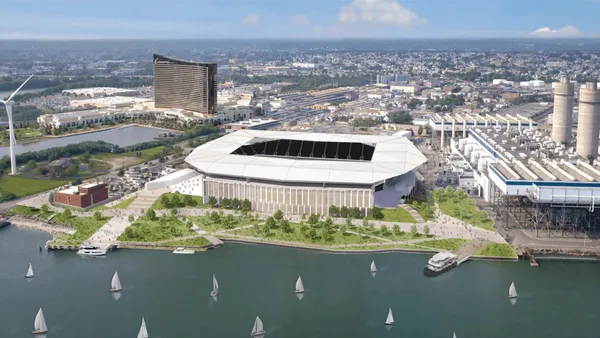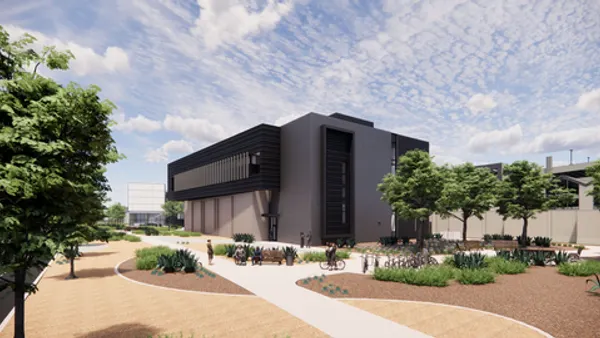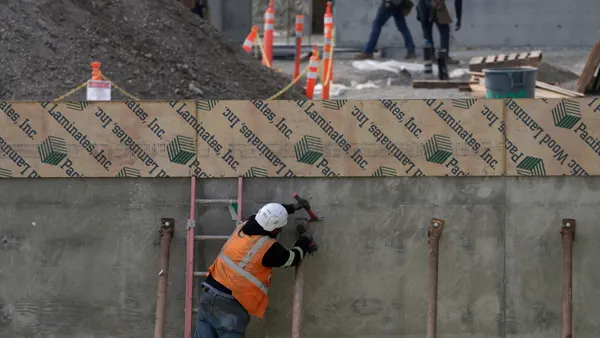Dive Brief:
- Construction and engineering giant AECOM has announced its plans to buy Oakland, CA–based Shimmick Construction for $175 million, according to The Wall Street Journal. The move will expand AECOM's operations in the Western U.S. and, in particular, California, as the state expects to see around $180 billion in infrastructure investment.
- Shimmick has worked on extensive projects in the West, from updates and repair work on San Francisco's Golden Gate Bridge to the South Bellevue Extension in Seattle. The company has a $1.35 billion project backlog, including a highway bridge replacement near Port of Long Beach, that AECOM will now take on.
- AECOM's revenue totaled approximately $17.4 billion in 2016, with roughly $7 billion from the construction sector. The company expects to see soaring demand in the coming years as California prepares for double-digit growth in its infrastructure market.
Dive Insight:
In addition to the voter-approved infrastructure spending measures in California, state lawmakers also passed a $52 billion transportation funding measure earlier this year. These major wins for California's infrastructure sector signal booming demand in the industry over the next several years.
This move by AECOM follows the company's acquisition of Tishman Construction in 2010 and Hunt Construction in 2014, which also served to expand AECOM's construction business significantly. In February, the company announced that it was rebranding the two fast-growing acquisitions to AECOM Tishman and AECOM Hunt.
AECOM also grabbed headlines in May, when it announced its plans to hire more than 3,000 workers for its North American infrastructure operations over the next six months. Those positions will range from skilled labor to engineers and architects who will work on the firm's transportation, building, environment, water, defense and energy projects.
AECOM said the decision to boost its employment numbers came in response to a renewed focus on the nation's infrastructure — particularly President Donald Trump's proposed $1 trillion infrastructure program. After Trump made infrastructure a major focus of his 2016 presidential campaign, AECOM responded in April with the formation of a new federal construction division. That division will concentrate its efforts on meeting federal clients' — in particular, the country's military construction program, General Services Administration and State Department — requests with design-build and integrated project delivery methods.
In early 2017, Bloomberg noted that AECOM was preparing to set a five-year, $3.5 billion program of procurement and investment in motion to attain and solidify its position as the world's largest infrastructure firm. The Trump administration's ambitious, though still ambiguous, plans for U.S. infrastructure could help push AECOM closer to that goal in the coming years.
Still, a lag in concrete details from the administration has left construction firms and industry observers wary of placing their bets on Trump's proposal for the foreseeable future. Sen. John Thune, R-SD, and chairman of the Commerce, Science and Transportation Committee, said last month that work in Congress on Trump's infrastructure plan could be on hold until 2018 as legislators struggle to reach a compromise on issues around tax reform, healthcare, the debt ceiling and other government spending programs. Congressional Republicans have continued to speak out against the possibility of allocating significant government investment in an infrastructure suite that resembles a stimulus package.
Trump's 2018 budget proposal alludes to a focus on promoting private investments over public spending, with the plan laying out a 13% cut to the Department of Transportation program that would see the elimination of the Federal Transit Administration's Capital Investment program, funding for long-distance Amtrak rail services and Transportation Investment Generating Economic Recovery (TIGER) grants.
Along with uncertainty surrounding the implementation of Trump's infrastructure program, AECOM and other construction firms could face headwinds from the industry's skilled-labor shortage. Though 73% of construction companies surveyed by the Associated General Contractors said they expect to take on more work this year, an equal percentage said they also expected to struggle filling their worker pipeline.










